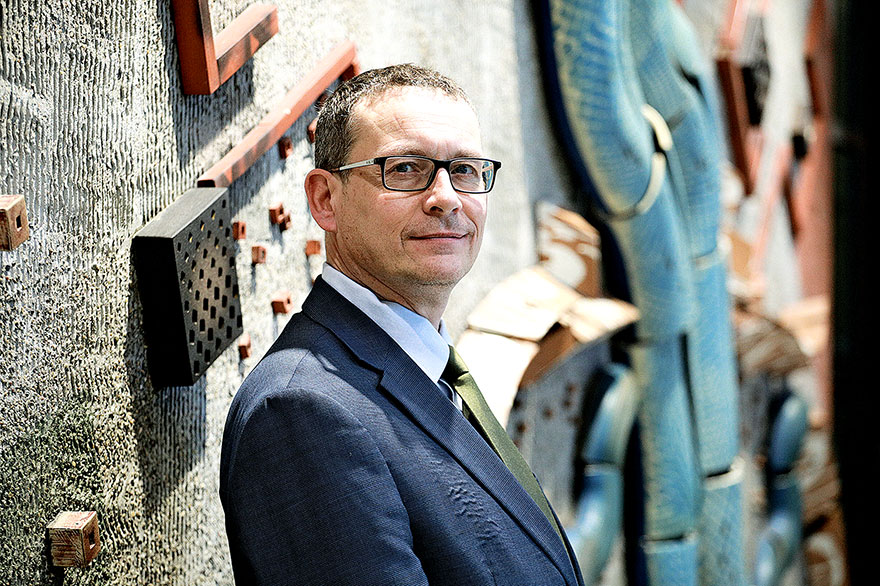The Government of Canada is adamant that the protection of human rights, both in Canada and globally, has to be high on the agenda of companies, and that’s why it encourages Canadian businesses to approach their international projects by placing human rights at the very heart of their endeavors
The Government of Canada has insisted, and will always insist, on the protection of human rights in Canada and around the world. We continue to encourage Canadian businesses to develop their international projects by placing human rights at the very heart of their projects, thus building Canada’s reputation as the global leader of responsible business conduct, says Canadian Ambassador to Serbia Giles Norman at the start of our interview, which is focused on the values underpinning the Responsible Business Conduct Strategy adopted by the Government of Canada in April 2022.
The Responsible Business Conduct Strategy (RBC) represents continuity with some shifts, including the introduction of new tools and requirements to help Canadian companies achieve leading responsible business practices, greater alignment with the wider priorities of the Government of Canada, and the establishment of an action plan and a monitoring and evaluation framework, explains our interlocutor.
As part of the Strategy Action Plan, the Government of Canada will develop an RBC due diligence standard that will complement existing international and Canadian reporting frameworks, and provide a common set of indicators for Canadian companies to account for how they address actual and potential negative impacts on their business activities, explains the ambassador.
“We will also develop interactive tools to provide companies with information on social and environmental risks related to specific markets and sectors. These tools will aim to increase awareness among Canadian companies regarding the risks they may face in the international markets.
“Coupled with the control mechanisms developed by the Government of Canada, such as the Canadian Ombudsperson for Responsible Enterprises (CORE) and Canada’s National Contact Point (NCP) for RBC under the OECD, we continue to encourage businesses to conduct their international activities in the “Canadian way”,” concludes our interlocutor.
What values does “doing business the Canadian way” entail?
– Canada’s global reputation as RBC leader comes from our country’s commitment to doing things in responsible ways, contributing to more sustainable growth and building a better future for all. It means respecting human rights, protecting the environment, advocating for gender equality and combating discrimination while furthering diversity and inclusion.
It means prioritizing the interest of the people and protection of the environment in your everyday activities, no matter the costs of such an approach, because our failure to act responsibly inevitably disturbs the trust that societies have in the government and businesses. Canadian Prime Minister Justin Trudeau once said: “Openness, respect, integrity – these are principles that need to underpin pretty much every other decision that you make” and that is the essence of “doing things the Canadian way”.
How have responsible business practices evolved over time, from the government’s perspective?
– RBC is central to Canada’s trade diversification strategy, inclusive trade and sustainable and inclusive economic growth. Throughout the past 10 years and more, the Canadian legal environment has evolved to ensure greater commitment to RBC. The Strategy relies on the previous five-year document that was adopted by Canada in 2009 and 2014. But, both in Canada and internationally, our government has developed other policies, standards and institutions to build the RBC framework and share our beliefs and commitment with other countries.
The Extractive Sector Transparency Measures Act (ESTMA) came into force in 2015 and helps the Government of Canada deter corruption in the extractive sector. Amendments to the Customs Tariff made in July 2020 prohibited the importation of goods that are mined, manufactured or produced wholly or in part by forced labor. In addition, the Government is committed to enacting legislation to eradicate forced labor from Canadian supply chains and ensure that Canadian businesses operating abroad do not contribute to human rights abuses.
Canada’s global reputation as RBC leader comes from our country’s commitment to doing things in responsible ways. That means respecting human rights, protecting the environment, advocating for gender equality and combating discrimination while furthering diversity and inclusion
Canada has ratified several international treaties and adheres to various guidelines that promote RBC, including the UN Principles on Business and Human Rights, and the OECD Guidelines on Multinational Enterprises.
In 2000, Canada established the National Contact Point for RBC under the OECD, as a tool to promote international RBC standards, but also to offer a mechanism for addressing grievances to those who feel they have been adversely affected by the operations of Canadian companies.
What kind of support does the Canadian state offer businesses to help them navigate ethical and environment standards?
– Canada offers three means of support to our businesses in order to help them incorporate, improve and/or implement RBC standards in their operations.
Firstly, the government of Canada aims to introduce new tools to help companies better understand and mitigate risks, by providing clear guidance to businesses on how to conduct RBC due diligence and help them de-risk their international business activities, including in their supply chains. This will be especially important for SMEs, which comprise about 99.8% of Canadian companies and account for 55% of Canada’s GDP and 41% of its goods exports.
Secondly, to ensure that Canadian businesses requesting support from the Government of Canada comply with the RBC expectations, they will be obliged to complete the Digital RBC Attestation. Through the Digital RBC Attestation, companies will acknowledge the importance of RBC, including adherence to Canadian laws and other international legal standards and norms, primarily with respect to human rights and the environment.

It is not enough to set up the RBC legislative and institutional framework and ensure that businesses and governments adhere to those standards. We cannot guarantee that mistakes won’t be made, that incidents won’t occur. Canada has established two important remedy and dispute resolution mechanisms that provide accessible, lowcost and constructive dispute resolutions.
I have already mentioned Canada’s NCP for RBC under the OECD, which is mandated to promote the OECD Guidelines, respond to enquiries and offer facilitated dialogue and mediation to all sectors on a wide range of issues related to human rights, labor, the environment and bribery. In April 2018, the Government of Canada announced the establishment of the Canadian Ombudsperson for Responsible Enterprise (CORE), which is mandated, amongst the other responsibilities, to review allegations of human rights abuses arising from the operations of Canadian companies abroad in the mining, oil and gas and garment sectors. I’m glad that the current ombudsperson, Sheri Meyehoffer, will also have an opportunity to present the work of her office in this special edition.
How well do business goals aimed at maximizing profit go hand-in-hand with these standards, which often impose additional costs and investments?
– Building trust is key to any successful relationship, be that in business or other segments of our lives. To be able to gain trust, people and businesses need to understand the rights of societies and respect them when conducting their activities. By neglecting them, businesses increasingly run the risk of being unable to develop or start new partnerships or enter new markets. They inevitably lose trust.
By leading digitalization in the RBC sector, our government can ensure that companies conduct their operations “in the Canadian way”, both in Canada and abroad
Therefore, in the short-term, businesses may consider that time and money invested in understanding and integrating RBC in their activities will not justify the (potential) profit reduction. However, companies should really consider these costs as an investment in their future, since modern societies prioritize human rights over unsustainable economic development.
Very soon businesses will have an imperative to integrate RBC into their operations if they want to remain competitive in the international markets.
Canada is recognized globally for the size and importance of its mining industry, which has long been in the spotlight for its negative impact on the environment and local communities. How does the RBC Strategy and/or other Canadian developed or supported RBC standards hold Canadian companies accountable in their projects, both in Canada and overseas?
– Canada has a long history in mining. From the 19th century onwards, mining has been one of the key industries of Canada’s settlement and development, starting from early operations in Quebec, to modern mines in the Arctic circle. The mining industry today provides a 5% contribution to our GDP, while directly and indirectly employing more than 600,000 people.
Global society is striving for a smart, clean and sustainable future based on a digitalized economy, renewable energy sources and decarbonization. Such a future will rely on the Internet of Things, wind and solar energy, electric vehicles and battery storage. Critical minerals are key components of these products, thus making mining an intrinsic part of the future we’re striving to create. The world will need more mining, not less. Putting people and the environment first will be an imperative for the mining industry. This means enhancing the industry’s responsible business conduct.
The Government of Canada, and our industry as a whole, encourage Canadian mining companies to run their international projects as they do in Canada. Companies are obliged to respect domestic laws in their countries of operation, but they are also responsible for respecting Canada’s laws and standards.

The Mining Association of Canada (MAC) has developed the standard Towards Sustainable Mining (TSM), which provides MAC members with a set of tools and indicators to turn these standards into action on the ground and respect the highest environmental and social commitments. It also enables local communities to gain insight into the operations of these mining companies, including in areas such as community engagement, tailings management and biodiversity. Nine countries, including Australia and Finland, have so far adopted TSM as their local standard, and we hope it will continue to be promoted around the world by Canadian companies.
In order to enhance the control mechanism of an industry that faces major public criticism, the Government of Canada continues to build its own control mechanism. It was in March 2021 that the government launched the work of Canada’s Ombudsperson for Responsible Enterprise (CORE). This institution has a mandate to receive and review complaints of human rights violations lodged by local communities from the jurisdiction of Canadian companies’ operations in the extractive, chemical and textile industries. As a non-judicial mechanism, the CORE can mediate the settlement of a dispute between a local company and Canadian business.
How does digitalization help in the process?
– Global digitalization is a tool that supports efficient business conduct and enables better time management in our everyday lives. The Canada RBC Abroad Strategy will offer Canadian businesses interactive tools with information on social and environmental risks related to specific markets and sectors. These tools will aim to increase awareness among Canadian companies of the risks they may face, and help them mitigate risks by incorporating RBC standards into their operations.
On the other hand, the CORE mechanism will enable local communities and individuals to protect their human rights, including rights related to environment protection, even if they are distant from Canada’s territory. By using digital tools to report relevant claims, communities and individuals can be sure that the CORE will process their cases and offer mediation in any dispute between a Canadian business and the reporting party.
By leading digitalization in the RBC sector, our government can ensure that companies conduct their operations “in the Canadian way”, both in Canada and abroad.
| INCLUSIVENESS The Responsible Business Conduct Strategy is central to Canada’s trade diversification strategy, inclusive trade, and sustainable and inclusive economic growth | COMMITMENT The Canadian Government is committed to enacting legislation to eradicate forced labor from Canadian supply chains and prevent human rights abuses | STANDARDS The Government of Canada, and our industry as a whole, encourage Canadian mining companies to run their international projects as they do in Canada |
|---|